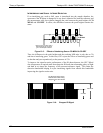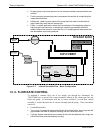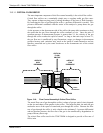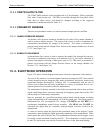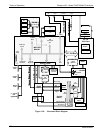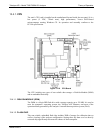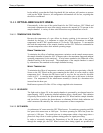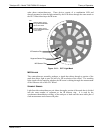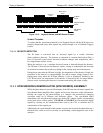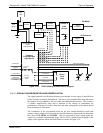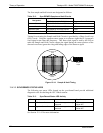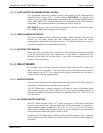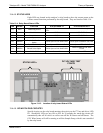
Theory of Operation Teledyne API – Model T300/T300M CO Analyzer
310
In the unlikely event that the flash chip should fail, the analyzer will continue to operate
with just the DOM. However, all configuration information will be lost, requiring that
the unit be recalibrated.
13.4.2. OPTICAL BENCH & GFC WHEEL
Electronically, in the case of the optical bench for the T300 Analyzer, GFC Wheel and
associated components do more than simply measure the amount of CO present in the
sample chamber. A variety of other critical functions are performed here as well.
13.4.2.1. TEMPERATURE CONTROL
Because the tem
p
erature of a gas affects its density resulting in the amount of light
absorbed by that gas, it is important to reduce the effect of fluctuations in ambient
temperature on the T300’s measurement of CO for the T300 Analyzer. To accomplish
this both the temperature of the sample chamber and the GFC Wheel are maintained at
constant temperatures above their normal operating ranges.
B
ENCH TEMPERATURE
To minimize the effects of ambient temperature variations on the sample measurement,
the sample chamber is heated to 48C (8 degrees above the maximum suggested ambient
operating temperature for the analyzer). A strip heater attached to the underside of the
chamber housing is the heat source. The temperature of the sample chamber is sensed
by a thermistor, also attached to the sample chamber housing.
W
HEEL TEMPERATURE
To minimize the effects of temperature variations caused by the near proximity of the IR
Source to the GFC Wheel on the gases contained in the wheel, it is also raised to a high
temperature level. Because the IR Source itself is very hot, the set point for this heat
circuit is 68C. A cartridge heater implanted into the heat sync on the motor is the heat
source. The temperature of the wheel/motor assembly is sensed by a thermistor also
inserted into the heat sync.
Both heaters operate off of the AC line voltage supplied to the instrument.
13.4.2.2. IR SOURCE
The light
used to
detect CO in the sample chamber is generated by an element heated to
approximately 1100
o
C producing infrared radiation across a broad band. This radiation
is optically filtered after it has passed through the GFC Wheel and the sample chamber
and just before it reaches the photo-detector to eliminate all black body radiation and
other extraneous IR emitted by the various components of those components.
13.4.2.3. GFC WHEEL
A synchron
ous AC motor turns the GFC Wheel motor. For analyzers operating on 60Hz
line power this motor turns at 1800 rpm. For those operating on 50Hz line power the
spin rate is 1500 rpm. The actual spin rate is unimportant within a large range since a
phase lock loop circuit is used to generate timing pulses for signal processing.
In order to accurately interpret the fluctuations of the IR beam after it has passed
through the sample gas, the GFC Wheel several other timing signals are produced by
06864B DCN6314



